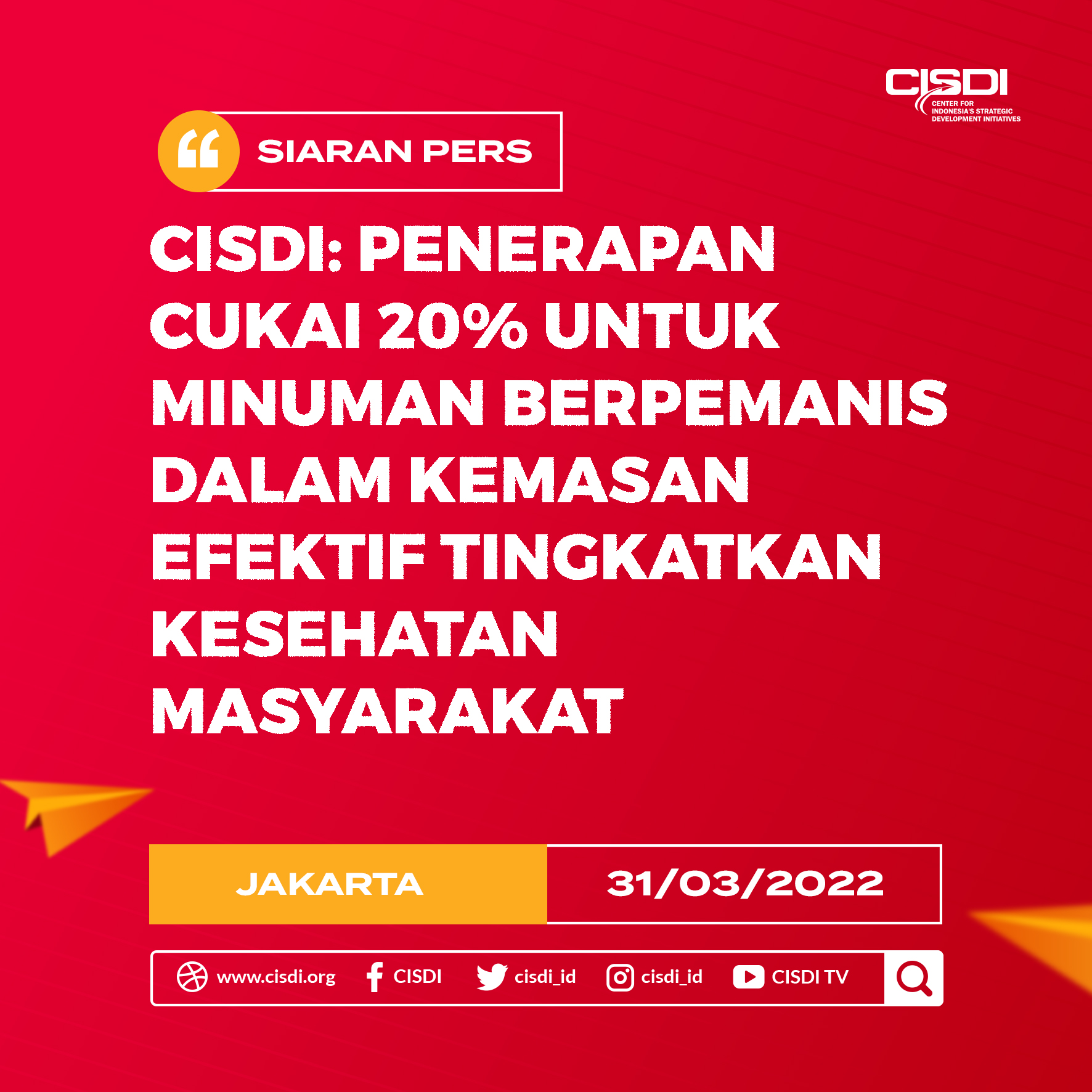
Press Release
Investing in the Future through Excise Tax on Sugar-sweetened Beverages
CISDI Secretariat • 30 Mar 2022
Jakarta, 31 March 2022 - The Center for Indonesia's Strategic Development Initiatives (CISDI) launched a policy brief on the Urgensi Implementasi Kebijakan Cukai Minuman Berpemanis dalam Kemasan (MBDK) di Indonesia (The Urgency of Implementing Excise on Sugar-sweetened beverages(SSB)) in Indonesia on Thursday (31/3).
CISDI emphasizes two important points, the recommendation for implementing SSB excise based on sugar content at a rate of 20% of the price and political and public commitment on the implementation of the SSB excise tax in Indonesia.
Abdillah Ahsan, researcher at the University of Indonesia and CISDI advocacy expert, said, "We recommend that the government immediately implement the SSB excise duty on all products without exception and simultaneously, covering all sweetened drinks in the form of original sugar as well as food additives. The best excise tariff is a minimum of 20% of the SSB product price and is applied in a multi-layer manner based on the sweetener content.”
The recommendation for implementing the SSB excise tax is rooted in the increase in consumption of SSB products in Indonesia by 15 times in the last two decades. The high consumption of SSB contributes to an increased risk of obesity and non-communicable diseases (NCDs), such as diabetes, liver and kidney damage, heart disease, and several types of cancer.
If not taken seriously, this will cause the burden of morbidity and mortality due to NCDs to increase in the future. Gita Kusnadi, acting officer of CISDI Research Manager, said that currently seven out of ten causes of death in Indonesia are due to NCDs, with diabetes occupying the third position.
"Diabetes currently affects 19.5 million Indonesians, and it is estimated that it will continue to increase to 28.5 million sufferers in 2045. Therefore, it needs to be suppressed immediately, one of the ways is through the implementation of the SSB excise tax," explained Gita.
In addition, Gita also emphasized that education and outreach efforts to the public regarding the dangers of excessive sugar consumption alone are not enough. "Changes in behavior in society cannot be achieved through promotive efforts alone, stronger policies and other interventions are needed to complement these efforts," she added.
Diah Satyani Saminarsih, Senior Advisor for Gender and Youth for the Director General of WHO and Founder of CISDI, also agreed with Gita. According to Diah, policies to improve public health status need to be in harmony with the support of non-health policies.
"The commitment to reduce the health burden due to non-communicable diseases, such as obesity and diabetes, must also be supported by policies to control risk factors, such as the consumption of sugar, salt and fat (GGL). Therefore, implementing SSB excise tax is not only the right choice, but also highly recommended by WHO," Diah concluded.
In line with Diah, Dr. Ackhmad Afflazir, MKM, Chair of the Health Financing Working Team, Center for Health Financing and Decentralization Policy (Pusjak PDK), said that the Ministry of Health stated that the number of NCDs in Indonesia had definitely affected national health financing, so he emphasized the importance of implementing SSB excise.
"The root of the problem must be resolved first, one of which is through controlling the consumption of foods and drinks with high GGL. In this case, SSB excise tax can be seen as an effective way to control people's consumption of sugary drinks," said dr. Achmad.
SSB excise tax is a fiscal policy that has been proven to be effective in reducing consumption of products with a negative impact and has been adopted in more than 40 countries in the world. This reduction in consumption will help control obesity and diabetes rates and support the acceleration of achieving the targets of the National Food and Nutrition Action Plan (RAN-PG) 2021-2024. Part of the SSB excise tax revenue can also be used for public purposes, especially those related to health, so that the wider community can benefit from its use.
Tulus Abadi, Chairman of the Daily Executive of the Indonesian Consumers Foundation (YLKI) stressed that the application of excise tax in Indonesia confirms the government's commitment to fulfilling the right to protection of public health. The implementation of this policy reduces SSB marketing which is in line with the Ministry of Health's campaign regarding reducing GGL consumption.
"Apart from protecting the public, the implementation of excise duty can control the health financial deficit from diseases caused by consumption patterns of SSB in the community. We must push this effort as an instrument to achieve true public health," said Tulus.
.png)